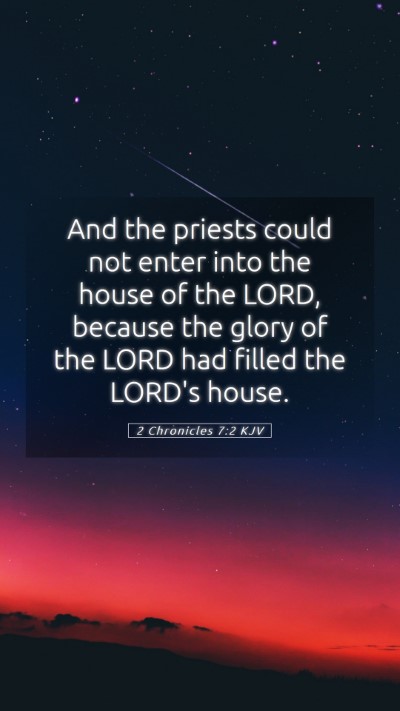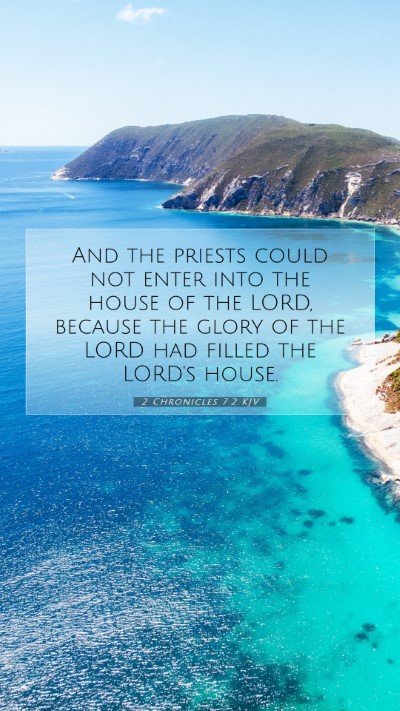Understanding 2 Chronicles 7:2
2 Chronicles 7:2 states, "And the priests could not enter into the house of the Lord, because the glory of the Lord had filled the Lord's house."
This verse describes a significant moment during the dedication of Solomon's temple when God's divine presence manifested in such a powerful way that it rendered the priests unable to perform their duties. Various public domain commentaries provide deep insights into the meaning and implications of this scripture.
Meaning of the Verse
The inability of the priests to enter the temple symbolizes the overwhelming holiness of God. As Matthew Henry explains, the glory of God is a reflection of His majesty and a demonstration of His divine authority. This overwhelming presence indicates the acceptance of the temple as a dwelling place for God among His people.
Biblical Exegesis
Adam Clarke further elaborates that the glory of the Lord signifies His divine approval of Solomon's temple as the place for worship. This moment reassures the Israelites of God’s continued presence as they transition into a more structured form of worship under Solomon’s reign.
Historical Context
During the time of Solomon, the Israelites had just established a new kingdom under a united monarchy, and building the temple was a crucial step in solidifying their national identity. Albert Barnes points out that God’s visible presence not only affirmed the temple’s importance but also served as a divine guide for the kingdom's future.
Spiritual Implications
The presence of God's glory in the temple serves as a reminder of the sacredness of worship and the reverent approach one should have toward God. Matthew Henry emphasizes that this incident illustrates that God cannot be approached casually; there is a solemn awe that accompanies genuine worship.
Application in Daily Life
The significance of this verse can also be applied to personal faith today. Just as the priests could not enter before the Lord due to His glory, individuals today might reflect on their lives to consider how they approach God in prayer and worship. Are we acknowledging His majesty? Are we aware of the holiness He embodies? This serves as an encouragement for believers to seek a deeper relationship with God through an understanding of His grandeur.
Cross References
- Exodus 40:34-38: God's glory fills the tabernacle.
- 1 Kings 8:10-11: The cloud fills the temple.
- Isaiah 6:1-3: The vision of God's glory in Isaiah's call.
- Luke 2:9: The glory of the Lord shone around the shepherds.
- Revelation 21:23: The glory of God illuminates the new city.
Conclusion
2 Chronicles 7:2 encapsulates a monumental moment where heaven meets earth through the glory of God in the temple built by Solomon. In exploring the meanings of this passage, believers can gain a richer understanding of God's holiness, the significance of worship, and how to apply these biblical insights in their lives. Engaging with scripture makes studying these verses more reflective and transformative.


